Free Ross Day
Who is Ross Ulbricht
Ross Ulbricht is the founder of the Silk Road, a dark-web marketplace. Bitcoin was the only currency used between buyers and sellers to keep transactions anonymous. The site was accessible through the Tor browser between February 2011 and October 1st, 2013 - a.k.a. Free Ross Day - The day of Ross’s arrest and when the FBI shut the Silk Road.
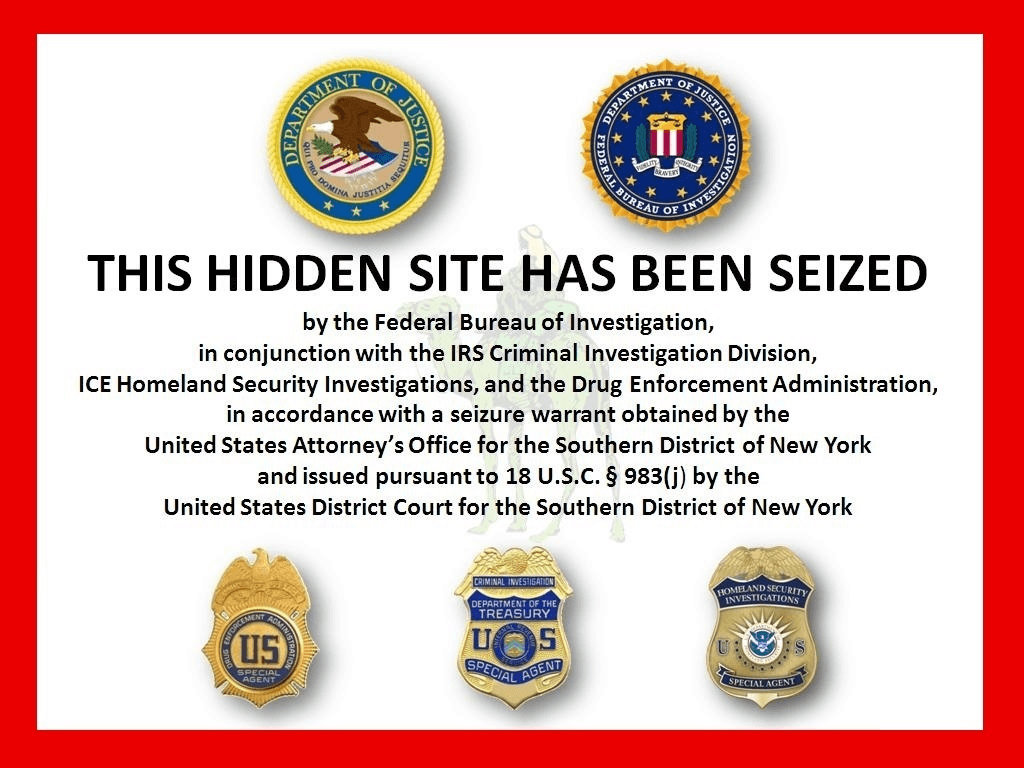
Although the federal prosecutors and media portray Ross as a dangerous kingpin, few people realize the role that Ulbricht and his creation of the Silk Road played in the rise of Bitcoin.
So, why is his arrest, the investigation leading up to it, and the court case which followed, such a big deal?
The entire Silk Road incident has set an unruly precedent where online service providers can be held criminally responsible for what their users buy, sell, and post on their platform.
One of the most unfortunate realities of Ross’s incarceration is that such a brilliant mind is kept locked away without the tools and resources to actualize the potential of his genius.
In spite of what the prosecutors and media have to say about Ross. First and foremost, Ross was never motivated by money or power.
He was very modest and had few possessions even though millions of dollars were pouring in from Silk Road commissions. He didn’t own a car and shared a house with 3 roommates; who testified on his behalf during the trial and who continue to visit Ross in prison. The most valuable thing he possessed was a passionate dedication to what he believed in.
Based on the hundreds of testimonies and letters from Ross’s friends and family members, one thing is clear: He has always been known for his peaceful, loving, and compassionate personality.
Ross is an idealist, caring about the future of the world. All he wanted was to give the people an opportunity to live freely. It’s ironic that such an intelligent, caring, and peaceful person received such a terrible verdict.
In the end Ross was sentenced to Double Life, plus 40 years, no parole and was ordered to pay $183 Million in restitutions. He is currently being held in the United States Penitentiary in Tucson, Arizona along side some of the nation’s most dangerous homicidal maniacs, kidnappers, terrorists, and worse.
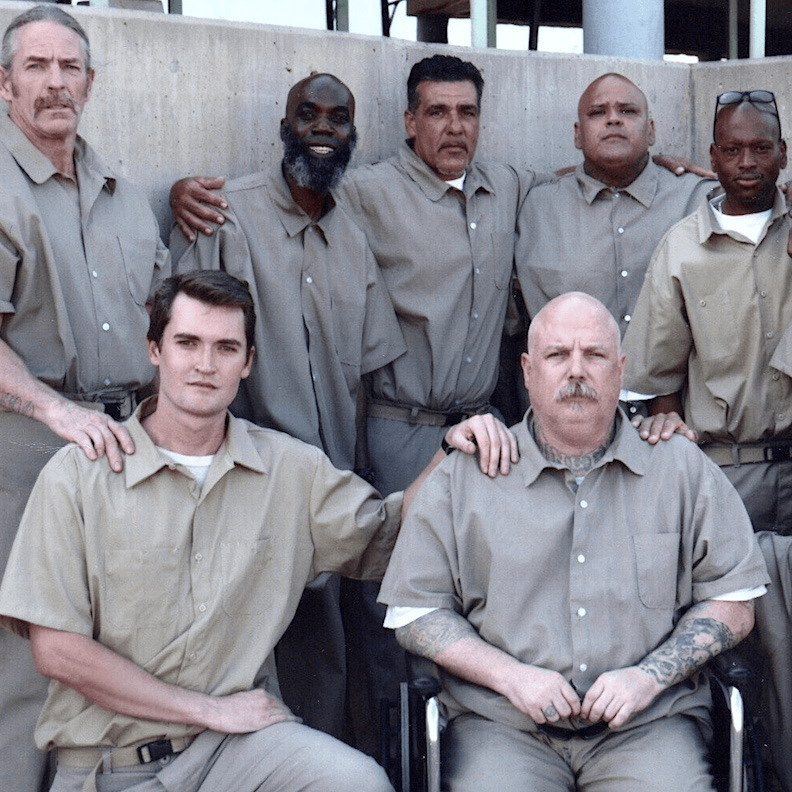
Regardless, Ross treats everyone he meets, even in prison, with utmost respect as he continues to help and inspire countless people around the world.
Childhood and Education
Born and raised in Austin, TX, Ross was an all-star as far as academics and extracurriculars are concerned. He grew up as an outdoor enthusiast with a love for nature’s beauty and the solitude and peace of mind it offered.

During his early 20’s, Ross wrote passionately about the concepts of individual freedom, limited government, liberty, privacy, and the free market.
Ross received a full ride academic scholarship to seek higher education at the University of Texas. Throughout his time there, Ross worked as a research scientist, contributing to technological advancements in solar energy at UT Dallas’s Nanotech Institute. He graduated in 2006 with a Bachelors in Physics.
His research has been published in peer-reviewed academic journals. Have a look:
- Polymeric Solar Cells with Carbon Nanotube Anodes
- Solar Cell Heat Treatment
- High Efficiency P3HT/PCBM Solar Cells
He continued his education at Pennsylvania State University where he assisted in the creation and development of oxide thin films.
While attending Penn State, Ross joined the university’s Libertarian Club and became especially interested in the the politico-economic philosophy of Ludwig von Mises. As a part of the club was a Ross played a big role in bringing Texas Representative, Ron Paul, to speak to the student body during his Presidential campaign on April 11, 2008.
In an interview from the event, Ross said “There’s a lot to learn from [Ron Paul] and his message of what it means to be a U.S. citizen and what it means to be a free individual.” “He doesn’t compromise his integrity as a politician and he fights quite diligently to restore the principles that our country was founded on,” Ross added.
He graduated in 2009 with a Masters in Materials Science and Engineering with an emphasis on crystallography. Ross wrote his thesis on the “Growth of EuO Thin Films by Molecular Beam Epitax”
He got into day trading for a short stint after graduating and attempted to start his own video game company. Both proved unsuccessful. Afterwards, he and a buddy got together and built Good Wagon Books, an online used book distributor.
As testament to Ross’s humanitarianism and generosity, Ross donated 10% of Good Wagon Book’s earnings to Explore Austin, a mentorship program for inner-city youth. He also donated all unsold books to Inside Books, a prison literacy program.
Even when he was still at Penn State, Ross Ulbricht was donating 10% of what little he received from lab research to Well Aware, an organization providing clean drinking water to Kenyan families.
Throughout college Ross developed skills in a wide variety of disciplines. Most notably his expertise in the areas of currency and entrepreneurship. It didn’t take long before he stumbled across Bitcoin and quickly realized the massive potential it held.
The Silk Road Mindset
Ross Ulbricht saw the world was in dire need of a change and thought “people should have the right to buy and sell whatever they wanted, so long as they weren’t hurting anybody else.”
When Ross’s business partner for Good Wagon Books moved away, Ulbricht began planning his next endeavor.
Ross made it official, declaring on his LinkedIn page: “I am creating an economic simulation to give people a first hand experience of what it would be like to live in a world without the systemic use of force.”
The plan was to create an open marketplace run by the users themselves, “where people could buy anything anonymously, with no trail whatsoever that could lead back to them.” It would be the ultimate expression of libertarian idealism and give people the freedom to make their own choices.
The result was Silk Road.
What was Silk Road?
Originally named “Underground Brokers”, the site was in development for six months before coming online in February 2011 when Ross Ulbricht was 26 years old. It was re-named “Silk Road” shortly after launch, based on the famous historical trade routes running through Europe, India, and Asia.

He created the website because he believed it was something the world desperately needed and lacked. In Ross’s eyes, it was a matter of moral responsibility to provide such a service.
In creating Silk Road, Ross wasn’t seeking financial gain or intending to cause anyone harm.
But, then again, the road to hell is paved with good intentions.
Silk Road was the first market of its kind on the dark web. It differed from popular sites like Amazon or Ebay because users could make anonymous transactions with unmatched security and privacy.
Ross never stored, transported, or personally dealt with anything sold on the Silk Road. The vendors handled everything themselves.
In addition to being an anonymous marketplace, Silk Road doubled as a community forum where topics like harm reduction practices were openly discussed. There was even a verified doctor hired to review and contribute to the forums.
Silk Road hosted an anonymous, private book club which still exists today as a private chatroom on the Tor browser. Most of the discussions revolved around conspiracy theories and computer hacking methods.
Fans of the Silk Road and similar sites claim online marketplaces like these provide a valuable service. Silk Road significantly reduced the risk of violence, a common occurrence in the illegal drug trade. Instead of buying from sketchy criminals on the streets they can do it from the safety of their own home.
Sellers and Buyers were able to sell and buy whatever they pleased on the condition that they were the responsible party, nobody else was involved besides the buyer and the seller. This was made possible though combing the anonymity of Bitcoin (BTC) with the security of the Tor/Onion browser.
How Did Silk Road Work?
In March 2013 Silk Road had over 10,000 products listed. Of those, around 70% were drugs in one form or another. These mind-altering substances were posted in in the following categories:
- Cannabis
- Dissociatives
- Ecstacy
- Intoxicants
- Opioids
- Other
- Precursors
- Prescription
- Psychedelics
- Stimulants
- Tobacco
- And much more
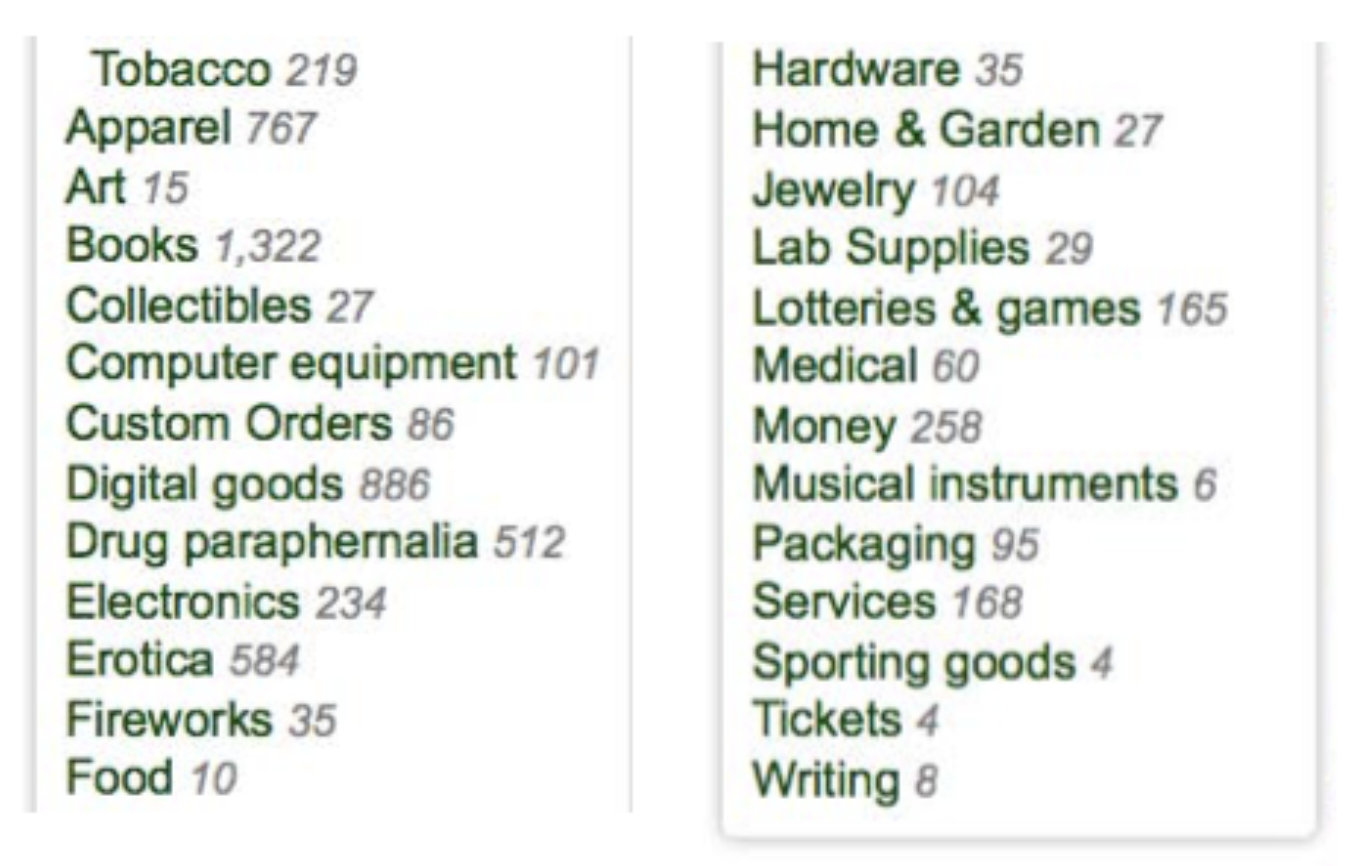
In accordance with Ross’s ideology of a truly free market, Silk Road’s user guidelines strictly forbade anything that could be used to defraud or cause harm. This included things like child pornography, stolen property, assassinations, weapons, counterfeit currency, personal information, and credit cards.
Any users found posting prohibited items for sale were immediately flagged and banned from the site. Other dark web markets like Black Market Reloaded didn’t have such restrictions.
Bitcoin Usage
Although all Bitcoin transactions can be tracked on the blockchain, as long as users didn’t link their identity with their crypto wallet, they could buy and sell anything with almost complete anonymity.
As Silk Road quickly grew to be one of Bitcoin’s primary use cases, Bitcoin became increasingly associated with the sale of illicit goods and services. This association played a significant role in shaping the public perception of the cryptocurrency in its early years.
When Ulbricht was arrested and Silk Road was shut down, many people feared it would be the end of Bitcoin as well.
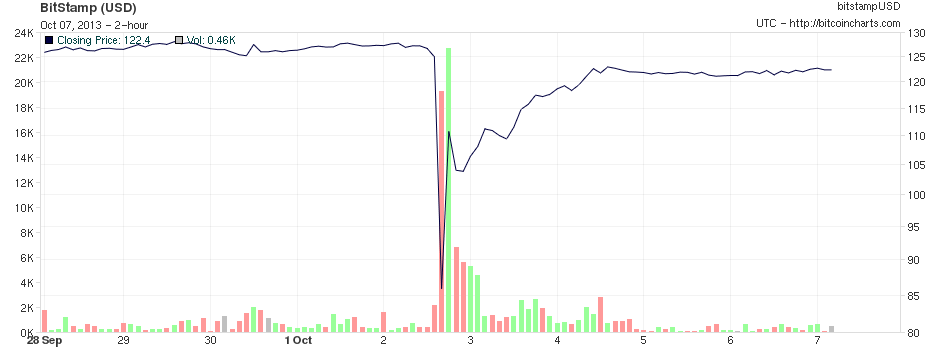
But instead, the opposite happened: Today, Bitcoin has become a mainstream asset, used for a wide range of legitimate transactions, from online purchases to international money transfers. It continues to grow and gain popularity as investors and entrepreneurs recognized the potential of the technology behind it.
Tor Usage
Buyers and sellers could securely access the Silk Road as a hidden service through the Tor network using the Onion browser.
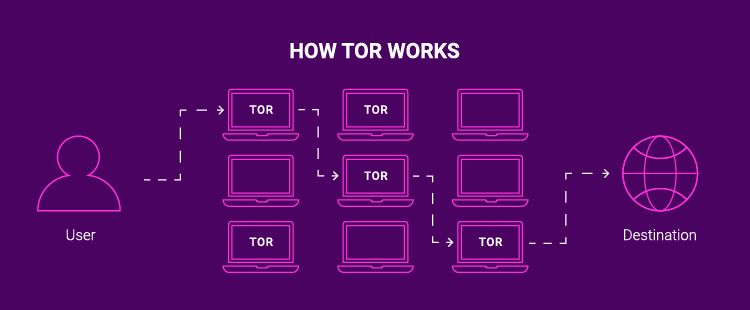
Tor is a global network of computer servers which encrypt data and re-route internet traffic to one another. By scrambling the server location, it makes it extremely hard to track a specific user’s identity, computer IP address, and their physical location.
Product and Seller Reviews
The biggest challenge Ross faced when designing Silk Road faced was how anonymous transactions could be verified. The brilliant solution Ulbricht came up with was to combine an escrow payment system with a way for buyers and sellers to review their experience.
To make a purchase, Bitcoin was sent to an escrow account until the order was received. This service helped mitigate Bitcoin’s volatility and prevent scams. As a part of the site’s ruled and regulations, if there was a significant change in Bitcoin’s price before the transaction was completed, a claim could be submitted and the price difference would be reimbursed by Silk Road.
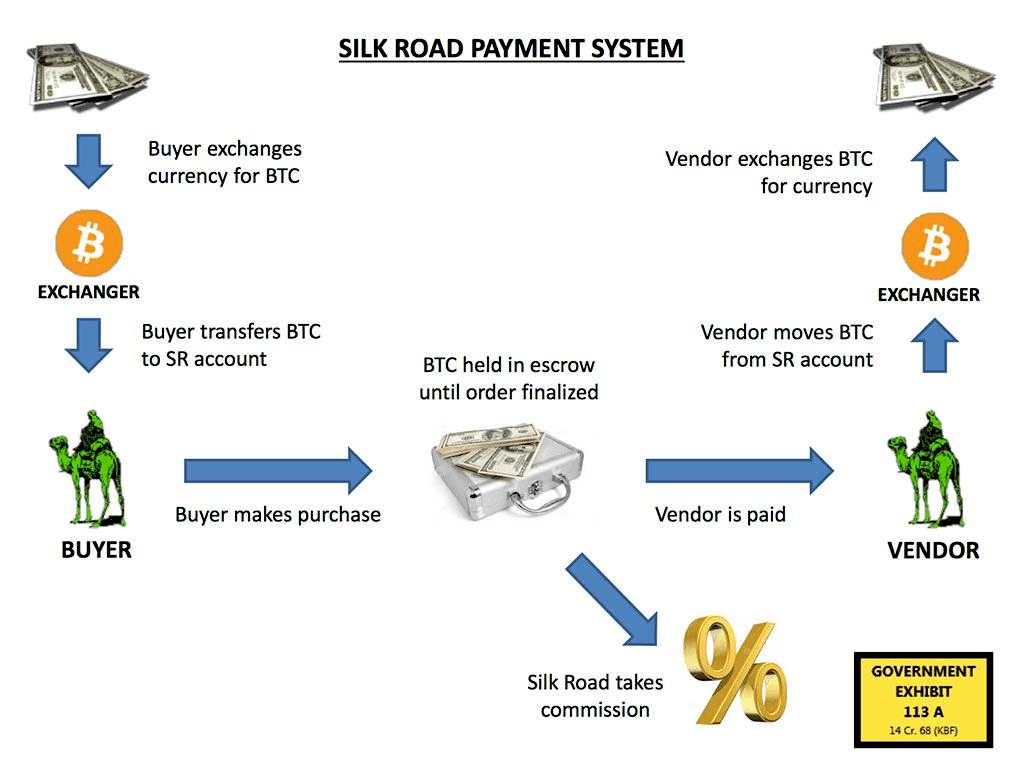
The rating system reflected the speed of shipping, quality of goods, and the seller’s reputation in the Silk Road community. This combination led to extremely fast shipping, more reliable service and, ultra-high quality products.
This made it safe and efficient for people to buy and sell whatever they could get their hands on, so long as no third-party was harmed - a picture perfect example of a free-market.
Downfall of Silk Road
During the beginning stages, a limited number of vendor accounts were available for purchase through on-site auctions. Eventually, Silk Road began allowing anybody to purchase a vendor account for a fixed fee.
Now, because anybody could sell (almost) anything without their identity being compromised, a few users got the idea to start peddling illegal drugs. Funnily enough, the #1 “illegal drug” sold on Silk Road was cannabis (i.e. weed, pot, devils lettuce), which is now either decriminalized or completely legal in the majority of the United States.
Although it now has the stigma of an illegal drug oasis, during it’s operation plenty of people used Silk Road to buy and sell regular everyday items like books, art, clothes, electronics, collectibles, etc. There were even job listings for programers and writing projects.
Silk Road really began to blow up and attract the attention of federal law enforcement after an article about the dark web marketplace was published in Gawker on June 1st, 2011 at 4:20pm.
The takedown
They way they found Ross is quite the spectacle.
Ulbricht was first tied to “DPR”, the primary admin account, by Gary Alford of the IRS. Gary was working with the DEA in mid-2013 when he linked the username “altoid”, used to announce Silk Road’s launch, to a coding forum where “altoid” make a post asking for programming help and included an email address containing Ross’s full name.
When the authorities finally caught up to Ulbricht, they had to come up with a plan to prevent him from encrypting or wiping files from his laptop during the arrest.
Here’s how it all went down at the San Francisco Public Library on October 1st, 2013 - Free Ross Day:
Two undercover agents pretended to be in an lovers’ quarrel. According to Joshuah Bearman of Wired, when Ross was sufficiently distracted, the agents quickly moved in to make the arrest while a third agent standing by grabbed the laptop and handed it to a fourth agent, Thomas Kiernan, who then inserted a flash drive into the laptop to swipe all the critical files.
The Seizure
Silk Road was only active for 2 and a half years before being seized by the FBI on October 1st 2013 - Free Ross Day.
According to official FBI documents released after the investigation, from February 6th, 2011 through July 23rd, 2013 Silk Road hosted 1,229,465 completed transactions between 146,946 unique buyers and 3,877 vendors.
This generated a whopping 9,519,664 BTC ($183 million) in sales and gave Silk Road owners 614,305 BTC ($13 million) in commissions. As you can imagine, these dollar values are much higher today than they were back in 2011-13 when the price for 1 BTC was going for anywhere between $5 and $100.
What happened to Silk Road’s Bitcoin?
The FBI initially reported seizing 26,000 BTC from Silk Road accounts but later declared they had seized an additional 144,000 BTC from Ross Ulbricht’s personal accounts.
On June 27th, 2014 US Marshals sold 29,657 BTC in 10 separate blocks. The rest of the Bitcoin remains in the hands of The Marshals, supposedly.
More than 6 years later, on November 3rd, 2020, a few people watching the blockchain noticed two transactions totaling 69,370 BTC coming from an old wallet address connected to the Silk Road. When these transfers took place, the dollar value was 58 times what it was worth back in 2015.
The US Government later claimed responsibility for the transfers, saying they were a part of a civil forfeiture. According to the US Attorney’s Office of the Northern District of California, these Bitcoins were originally taken from the Silk Road by a hacker who had only recently been apprehended by authorities.
Based on these reports, it’s clear there are still a few hundred Bitcoins completely unaccounted for.
Silk Road 2.0
5 weeks after Ross Ulbricht’s arrest and Silk Road was shut down by the FBI, the former administrators released Silk Road 2.0.
It wasn’t long before version 2 was making more sales per month than the original. A few months later, it too was eventually seized by the FBI as a result of Operation Onymous.
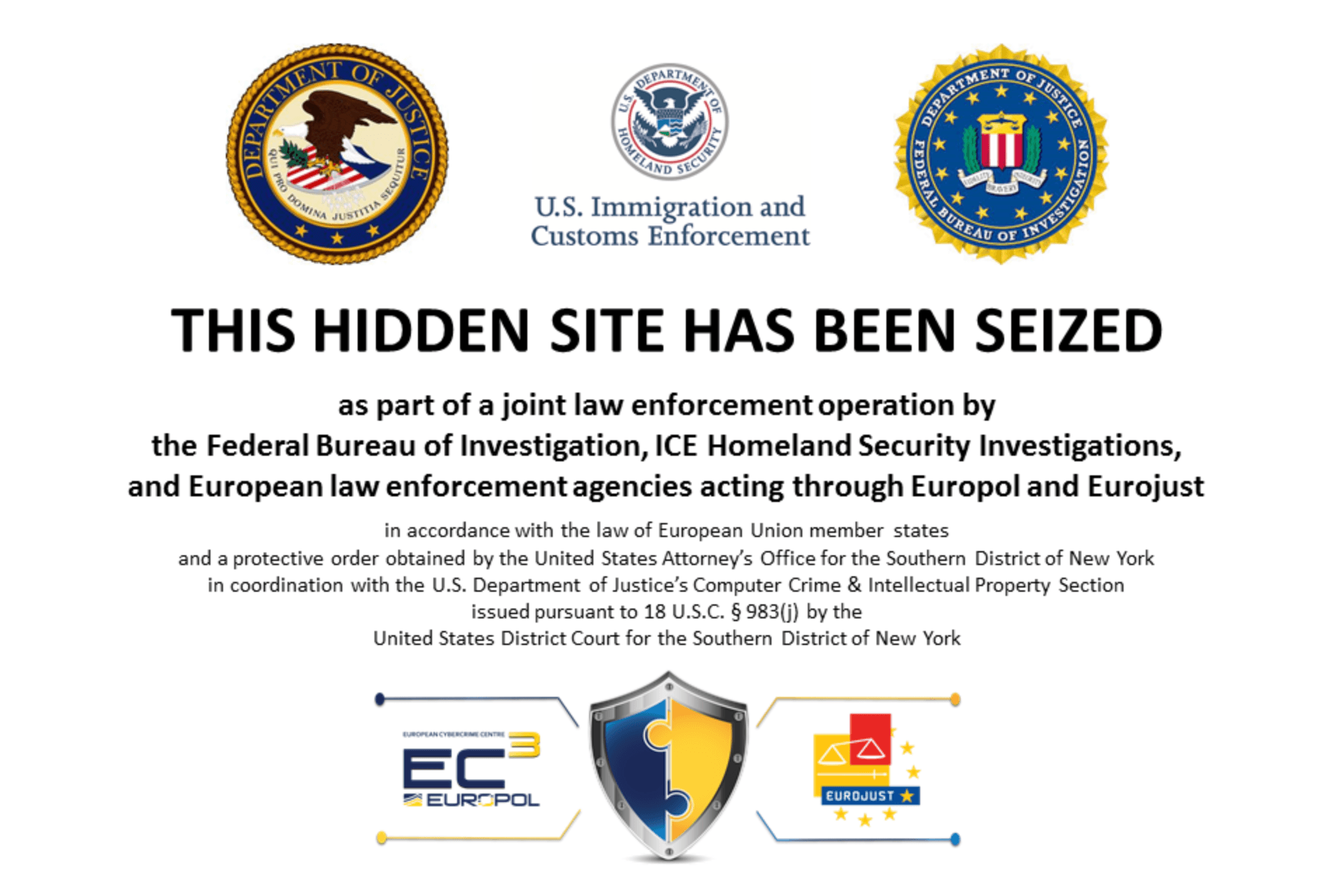
Within hours of Silk Road 2.0’s seizure, “Silk Road 3 Reloaded” went live but it too was taken down. In fact dozens of similar anonymous dark-web marketplaces are created and taken down on every year. It seems as though Ross started a movement.
As of now, Silk Road 4 remains active.
Court Case
Ross Ulbricht’s federal trial began on January 13th, 2015 - more than a year after his arrest.
The trial was based on accusations from government prosecutors that Ulbricht put hits out on Curtis Green, one of Silk Road’s moderators, even though no evidence was ever brought to verify this. There were also never any claims made that Ross had caused anyone harm or bodily injury. On top of this, no murder victims were named during the trial.
Surprisingly, on July 20, 2018 (approximately 5 and a half years after the initial arrest), this murder-for-hire allegation ended up being Dismissed with Prejudice.
The reality of the matter is Ross was never charged for selling drugs, hacking computers, or killing anybody. He was simply being prosecuted and held responsible for what others had listed and sold on the site he created.
From the beginning Ulbricht admitted to creating Silk Road but added that he had transferred control of the site to Mark Karpeles. Judge Forrest brushed this off, saying this transfer of ownership was merely speculative.
If you’re familiar with the history of Bitcoin, the name Mark Karpeles may sound familiar because he owned Mt. Gox, the largest Bitcoin exchange at the time. He was prosecuted and imprisoned in 2015 for data manipulation and fraud related to the famous Mt. Gox Hack and subsequent collapse.
In 2018, a few years after the heat died down, Karpeles said anywhere between a third and a half of all BTC transactions on Mt. Gox were linked directly with the Silk Road.
A few people thought this was unjust and decided to take matters into their own hands. They began posting Judge Forrest’s personal information, Social Security Number, and home address on dark web sites like The Hidden Wiki. Shortly afterwards, Judge Forrest began receiving death threats.
The supreme court declined to review the case before Ross Ulbricht’s final conviction on May 29th, 2015. In the end, U.S. District Judge Katherine B. Forrest handed Ross Ulbricht two life sentences plus 40 years, without parole and an additional order to pay $183 million in restitution.
The charges
In the end, Ross Ulbricht was charged for 5 non-violent crimes:
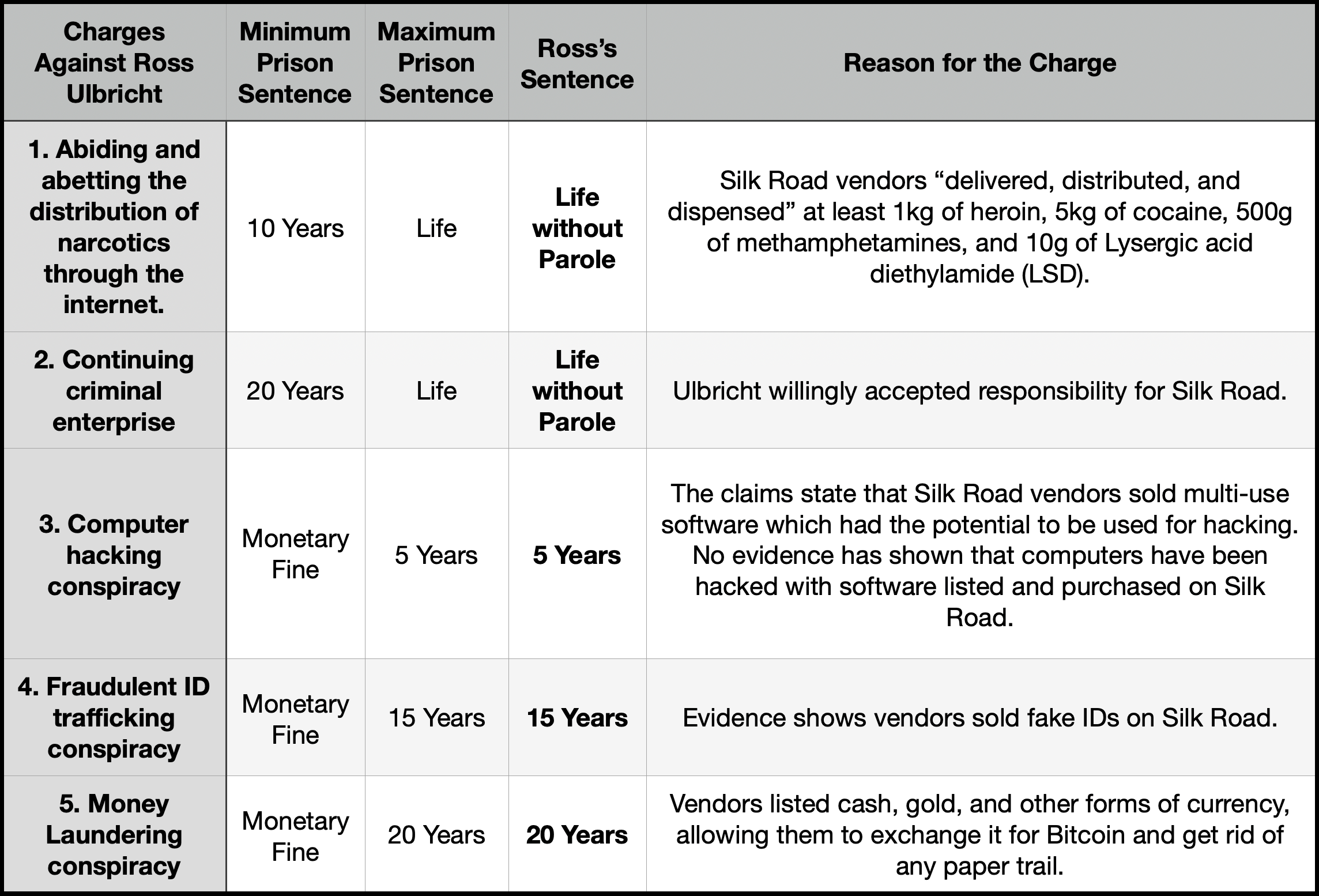
If you look closely at the reasons stated by the court, most of Ross Ulbricht’s charges come from what users bought and sold on his site. This is a clear violation of Section 230 of the Communications Decency Act, which protects service providers online from liability due to their users’ misconduct.
Unfair Sentencing
Although Ross Ulbricht received double life plus forty without parole, every other Silk Road defendant received a maximum prison sentence of 10 years. This includes those convicted of actually dealing drugs on the marketplace. Even the creator of Silk Road 2.0, Thomas White, was given a 5 year and 4 month sentence.
The co-owner of version 2.0, Blake Benthall, received the same charges as Ulbricht but was released after only 13 days in U.S. custody. He never served prison time because he struck a plea deal with global law enforcement agencies so the only charges to stuck with Blake involved crimes for tax evasion.
The Corruption
Since the final verdict, it’s been revealed that critical evidence was hidden from the jury in order to control the narrative. This was a directly violation of Ulbricht’s Right to Due Process and the Brady Rule.
Who was the Real DPR?
DPR, the username of Silk Road’s main admin account, stands for “Dread Pirate Roberts”. Ross picked this title as an ode to the character from the film, The Princess Bride, best known for his anti-regulation and pro-libertarian views.
Without any technical programming skills, Ross handed much of the control over to others during Silk Road’s first year online. Richard Bates, an old college friend of Ross, testified in court about how Ross had started distancing himself from the site as early as November 2011.
In one specific instance, a Silk Road employee named Andrew Jones came up with a secret virtual handshake to verify DPR’s identity. The “handshake” consisted of a question and response that only the two of them would know.
Weeks before Free Ross Day, Jones asked DPR the secret question - a book recommendation. The DPR Jones was messaging was unable to provide the correct response, which was any book written by Murray Rothbard.
The lead investigator on the case, Homeland Security Special Agent Jared Der-Yeghiayan (“JDY” for short), originally suspected Mark Karpeles and Ashley Barr to be the culprits behind DPR. This is evident from an email sent by JDY in August of 2012.
Karpeles’s lawyers met with federal prosecutors on July 11th, 2013. During this meeting they provided the name of someone else to target as the owner of the DPR account in exchange for Karpeles’s immunity. After this meeting Ross Ulbricht entered the government’s crosshairs.
In August 2013, Forbes published an interview with DPR. He said, “I didn’t start Silk Road, my predecessor did.” DPR went on to explain in the interview, that the creator wanted to “pass the torch” after the soon-to be owner discovered a “big vulnerability” in the code. Read the full interview HERE
Ten days before Free Ross Day, JDY mentioned explicitly in an email that he was “worried about the other two admins getting away.” Shortly after Ulbricht’s arrest, another email from JDY said Karpeles was “purging everything.” What that means exactly remains unclear.
To make things even crazier, archives show the last time someone logged into the DPR account was November 18th, 2013. By then, Ross had been in solitary confinement for seven weeks. Although it was his brainchild, all of this evidence makes it abundantly clear that Ross Ulbricht was not the only one running Silk Road.
The Corrupt Agents
In March 2015, Carl Mark Force of the DEA and Shaun Bridges of the Secret Service and NSA were arrested and charged for wire fraud and money laundering in connection with the Silk Road investigation.
These agents tricked Curtis Green, the same Silk Road admin and moderator Ross allegedly tried to have killed, into accepting a controlled delivery of drugs. After handing over his address, Green was arrested by Bridges and Force. During the interrogation, Green told the agents how to access the Silk Road through a backdoor.
The agents now had the power to change passwords, edit posts and messages, and even override entire accounts. With unlimited access, they decided they might as well also steal a few hundred Bitcoins as a little reward for all their hard work.
These agents were under investigation for almost a year before the trial began. Oddly enough, the prosecutors never told the jury the evidence being presented in court had been corrupted.
It wasn’t until seven weeks after the trial’s conclusion that these two federal agents, working at the core of the Silk Road investigation, were finally arrested and charged with corruption linked directly to the Silk Road case. They were never required to hand over their Silk Road chat longs, lap tops, email accounts, and other information which could be used to reveal the full extent of the corruption.
Bridges was originally sentenced to six years in prison and Force to six and a half. A few month’s into his prison sentence, Bridges received an extension after he was caught trying to move 1,606 Bitcoins he stole from Silk Road.
In November 2016, a third DEA agent was claimed to have been leaking information about the case and tampering with evidence by deleting or editing messages on Silk Road. Unfortunately, this mysterious third agent has never officially been named, arrested, or charged.
Carl Force completed his sentence and was released on October 9th, 2020 and Shaun Bridges on October 19th, 2021. Meanwhile, Ross remains in prison, continuing to serve his double life plus 40 year sentence.
Hitmen For Hire
Ross’s arrest in 2013 was based on an allegation that Ross hired mercenaries to kill Curtis Green, an avid supporter of Ross and the Silk Road since the beginning. The prosecution has yet to produce a witness or any sound proof that Ross wrote any of the anonymous murder messages.
Here’s a tweet from the supposed murder victim himself:
Ross Ulbricht got a raw deal. There is so much more to the Silk Road story than people know, and I can't yet talk about. I don't believe Ross is dangerous or that it's in his character to order a hit on anyone. He should never have gotten that horrible sentence. #FreeRoss
— Surviving the Crypto storm⚡️ (@ilovepoker) December 17, 2017
In a 2018 interview, Green spoke about how his messages and chat history on Silk Road had clearly been manipulated. This was most likely done by the corrupt government agents, Carl Mark Force and Shaun Bridges, who had the power to edit anything in the database.
These two agents were subsequently imprisoned because of the crimes they committed throughout the Silk Road investigation. When the Maryland government filed criminal complaints against Mark Force in March 2015, the responses revealed that Force faked Curtis Green’s death and, big surprise, nobody was killed.
Even though the murder was obviously never carried out and the anonymous chats used to back it up never showed any connection to Ross, the prosecutors claimed Ross was too dangerous to be given a shot at bail. This ultimately gave Judge Forrest the capacity to sentence Ross Ulbricht to double life plus 40 years without bail for non-violent offenses.
Unfortunately, it took more than half a decade after Free Ross Day before the allegation was Dismissed with Prejudice by the District Court of Maryland, on July 20, 2018. This means the murder-for-hire claim can never be re-filed or used against Ross Ulbricht again.
The murder-for-hire charge was finally dropped today. What a relief! It really hurt to have that hanging over me all these years, to be accused of being something I’m not. I just hope I won’t be seen in that light anymore. https://t.co/2Dd0Jt1xMq
— Ross Ulbricht (@RealRossU) July 28, 2018
The fact that uncharged and false accusations were used during sentencing has been brought as an argument in several amicus briefs from dozens of eminent organizations in support of Ross’s Supreme Court petition.
Data Dumps
A few months before the trial, prosecutors delivered overwhelming amounts of evidence to Ross Ulbricht’s legal team days before the trial. An additional 5,000 pages of the first witness’s testimony were released just two weeks before trial. Then, after the deadline, around 230 new pieces of evidence were presented. Much of which was only revealed hours before the trial started.
There was even one time during the trial when the prosecution presented a complicated spreadsheet consisting of millions of Bitcoin addresses. The defense literally heard about this for the first time in the middle of the trial and their request to prepare a cross-examination was denied.
After all was said and done, it amounted to 4 terabytes of data which. To put that into perspective, if it was all typed out on paper, it would comes out to around 2 billion pages. Reading 20 pages a day, it would take someone 273,973 years to go though everything.
On top of all this, the detention center staff withheld this data from Ross to prevent him from reviewing it and finding any proof that might redeem him, directly violating his 6th amendment rights.
The prosecutors got away with hiding all this information on the basis that it might tip off the corrupt agents and impede the investigation of the agents. Interestingly, there was evidence hidden in the mountain of data showing the two corrupt agents knew full well they had been under investigation for months at that point.
The prosecution’s claim that vital evidence must be kept concealed was a clear obstruction of justice as it prevented the jury from knowing all the facts and the extent of the corruption. It also made it nearly impossible for the defense to understand what was really going on.
Life in Prison
During his time in prison, Ulbricht has continued to find numerous ways to be a positive role-model and leader. He teaches classes, tutors, and mentors his fellow inmates. Ross’s most popular classes are in math, science, and yoga.
But he hasn’t stopped there.
He helps prisoners receive GEDs (high school diplomas) and leads Adult Continuing Education classes to help prepare them for advanced college courses.
“Mr. Ulbricht sits with the four of us every single day and we’ve made such great progress…He does all this without any expectation of something in return. It is solely to help others…His kindness and devotion to excellence have truly inspired us all.” – Michael Van Praagh, fellow prisoner and student, in letter to judge
Prison has allowed Ross to keep developing himself in many areas by affording him time to study topics like economics, physics, and the rapidly expanding world of AI.
Ross Ulbricht’s articles are being published on Medium or read them on freeross.org. His current pinned article is on the topic of using AI to prevent the spread of harmful and inappropriate content.
He still holds strongly to the principle of “do no harm” and advocates free personal choice, as long as it doesn’t negatively hurt another. As a testament of this, Ross has refused to participate in coordinated attacks on other prisoners.
At first glance, this may seem like it’s not a big deal, but avoiding certain activities in prison, such as gang-related fights or beatings, puts Ross’s own life in danger. It goes to show the extent in which Ross sticks by his anti-conflict values.
Due to his calm demeanor, well-meaning nature, and passionate drive he has earned the respect of prisoners and prison staff alike, regardless of where he’s been confined. Ross looks forward to the day when he gets out and can apply all of his knowledge and experiences to make a positive impact society and the world as we know it.
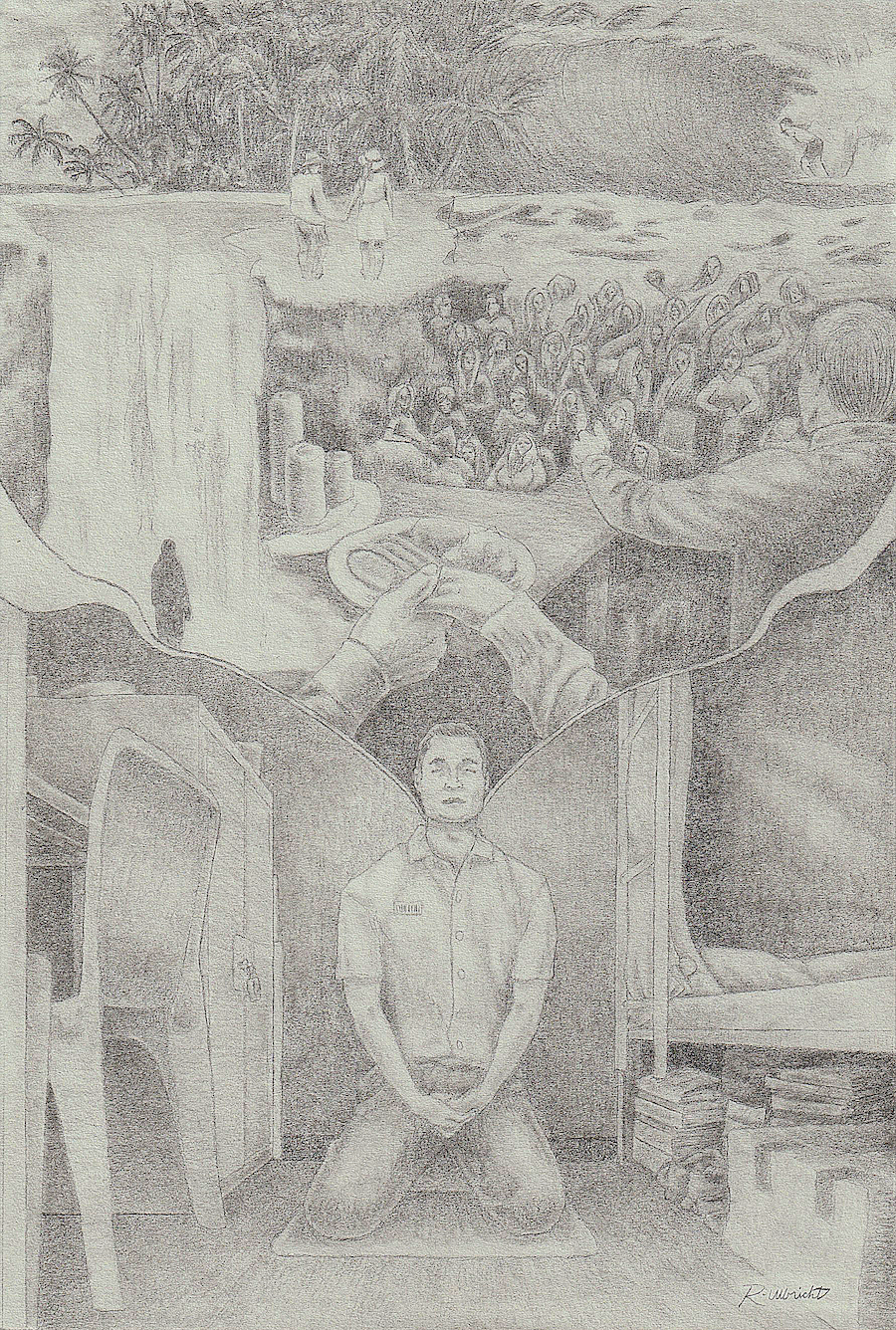
Supporters
By looking at the simple facts, Ross Ulbricht is loved and supported by everyone he comes across. And that love and support have done nothing but grown over the years he remains imprisoned.
“Ross spent his days sharing positive thoughts with the other inmates,…encouraged them to find peaceful ways to resolve their differences…He always chose the moral high ground in every situation…On many occasions, he expressed his extreme dislike for violence on any level.” – Michael Satterfield, fellow prisoner, in a letter to the judge
Since Free Ross Day, over 330 family members, friends, acquaintances and more than 130 of Ross’s fellow prisoners have taken the time to write or sign sentencing letters (pleas for minimum or reduced sentences) and clemency letters (requests for the complete pardon of a sentence). Many of these letters and petitions have been sent directly to the President of the United States.
There is an ongoing petition for Ross Ulbricht’s clemency which has already accumulated over 500,000 signatures. As a testament to Ross’s character and integrity, there are over 250 organizations and political figureheads who also continue to show support for Ross. He has gained support from across the political spectrum. Some have even donated to Ulbricht’s legal defense funds.
Conclusion
Silk Road was all about freedom.
Ross has since learned all too well that if people are given the freedom to buy and sell whatever they please, many will exploit it. He never sought to create a service to provide people fuel for their addictions.
He has learned wholeheartedly that even well-meaning and idealistic actions can have unintended and far-reaching consequences.
Ulbricht accepted responsibility from the get-go for creating silk road and has vowed that, upon his release, he will never come close to breaking the law.
Even with a non-violent history, non-violent charges, and a low security threat score, Ross Ulbricht remains imprisoned in a maximum-security facility because of the weight a double life plus 40 year sentence carries.
In a letter written before his final sentencing, Ross wrote the following: “I believed at the time that people should have the right to buy and sell whatever they wanted so long as they weren’t hurting anyone else. However, I’ve learned since then that taking immediate actions on one’s beliefs without taking the necessary time to really think them through, can have disastrous consequences.”
If you want to learn more about Ross Ulbricht and his Silk Road, check out Freeross.com. There is a a great book called American Kingpin and three awesome documentaries you could check out: Deep Web(2015), Silk Road-Drugs, Death, and the Dark Web(2017), and Silk Road(2021). These are all about the Silk Road case, Bitcoin, and the dark web. They provide valuable insights into the state of the world we are living in.
